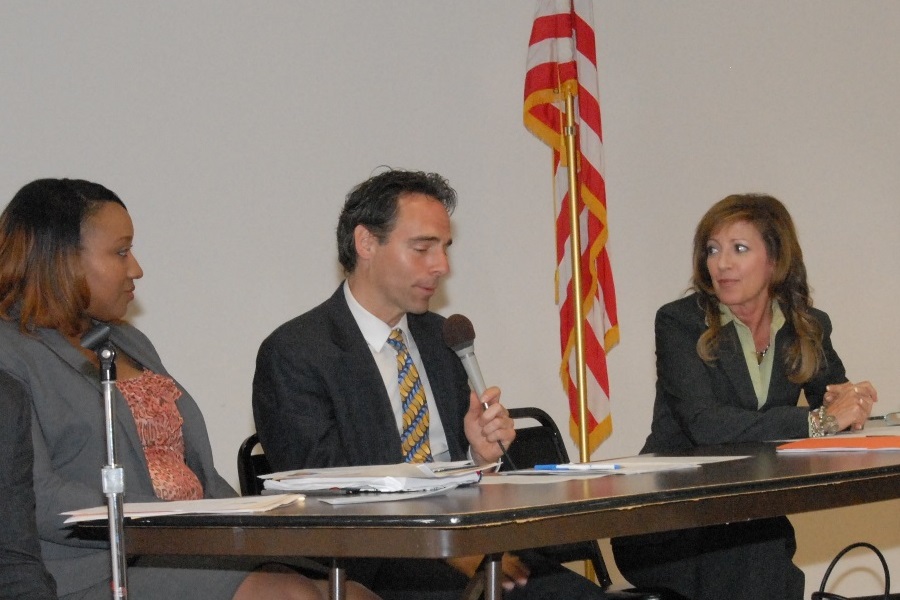
By Mike Dahaney
Losing a tax credit program that funds projects in six Illinois river towns, including Aurora and Elgin, would hinder further redevelopment in those cities, local officials told state lawmakers Monday.
The message delivered during a lunchtime hearing of the State Senate Commerce and Economic Development Committee in Rockford specifically related to the Hobbs Building and vacant St. Charles Hospital in Aurora and Elgin's Tower Building.
"This is an extremely important topic for the Aurora area," said Democrat State Sen. Linda Holmes of Aurora, who chairs the committee. "It's something we've utilized and need to utilize."
The session was hosted by Democrat State Sen. Steve Stadelman of Rockford and run by Holmes with Democrat State Rep. Litesa Wallace of Rockford also sitting in on the proceedings.
"It's a matter of timing and momentum," Elgin Assistant City Manager Rick Kozal told the lawmakers.
Kozal noted that the credits are an essential factor for making the redevelopment of Elgin's Tower Building happen.
"The building could be the poster child for the tax credit program," Kozal said. "Having the program in place led to interest in the building, the most iconic building in the city of Elgin."
Kozal also mentioned that the rest of Elgin's downtown was added to the National Register of Historic Places in December 2014, meaning an additional 100 buildings might be able to take advantage of the program if it is extended.
The River Edge Redevelopment Zone Historic Tax Credit program was put together to help five of the state's river towns revitalize, particularly their old downtowns. Those cities include Aurora, East St. Louis, Elgin, Peoria, and Rockford.
The program is set to expire Jan. 1, 2017. The River Edge extension bill would extend the program until January 2022.
Aurora Chief Development Officer William Wiet also testified and noted that the state's tax credits are intended to be used with federal rehabilitation tax credits.
"Aurora has been in competition with all other Chicagoland communities in the development and redevelopment of older, historic properties," Wiet said. "Often times, property owners and developers in Aurora cannot make the rehabilitation of older properties economically feasible, and for several reasons."
Those reasons, according to Wiet, include that the cost of rehabbing older big buildings can exceed the cost of new construction. The lease rates developers can get for space in Aurora is less than in other towns. And with lease rates lower, it's tougher to recoup construction costs.
Wiet and others testifying also noted that 33 states have their own historic tax credit programs, meaning Illinois is competing for developer dollars across the country. Others pointed to a University of Illinois study that claims for a return rate of $10 for every $1 invested because of the program.
Aurora recently became the first city to expand its redevelopment zone, so that it now includes the vacant St. Charles Hospital, the former Copley Hospital and many old industrial buildings along the river.
Wiet noted that a developer for the St. Charles Hospital said the project would not be happening but for the tax credits.
In Elgin, Capstone Development LLC of Missouri intends renovate the Tower Building, 100 N. Grove Ave., at a cost of $13 million. When completed, the building would hold a mix of 45 one- and two-bedroom apartments with rents ranging from $863 to $1200 per month.
Capstone would pay the building's owner, the Stickling Foundation, $1 million for the property. The developer is budgeting $8 million for hard constructions costs, including contingencies.
Capstone plans to utilize approximately $2.09 million in federal historic tax credits and $2.6 million in the state's historic tax credit program. Elgin has committed to provide $4.7 million of development assistance through tax increment funds for the project.
Chicago developer Richard Souyoul, who is partnering with Capstone said that the tax credits could contribute 18 percent to the funding the Tower project. With the program set to expire, Souyoul said, "Time is tight, and we're teetering on the fence (in getting the project financed)."
Not having the program could wind up hurting the state, Stadelman said.
"It's helping move the state forward. These communities need this incentive. It is one tool that has lured investment," Stadelman said.
Also testifying were Rockford Mayor Larry Morrissey, Peoria Assistant City Manager Chris Setti, and representatives from firms redeveloping properties in Rockford.
"The credits have made a night and day difference in getting deals done," Morrissey said.
After the session, Holmes said the hope is to get the extension bill moving to a vote sometime this legislative session as to not to leave further uncertainty for projects underway or under consideration.
"It's vital for the entire state," Holmes said.




